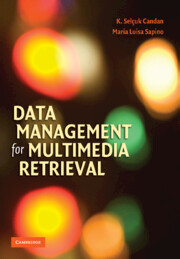Book contents
- Frontmatter
- Contents
- Preface
- 1 Introduction: Multimedia Applications and Data Management Requirements
- 2 Models for Multimedia Data
- 3 Common Representations of Multimedia Features
- 4 Feature Quality and Independence: Why and How?
- 5 Indexing, Search, and Retrieval of Sequences
- 6 Indexing, Search, and Retrieval of Graphs and Trees
- 7 Indexing, Search, and Retrieval of Vectors
- 8 Clustering Techniques
- 9 Classification
- 10 Ranked Retrieval
- 11 Evaluation of Retrieval
- 12 User Relevance Feedback and Collaborative Filtering
- Bibliography
- Index
- Plate section
12 - User Relevance Feedback and Collaborative Filtering
Published online by Cambridge University Press: 05 July 2014
- Frontmatter
- Contents
- Preface
- 1 Introduction: Multimedia Applications and Data Management Requirements
- 2 Models for Multimedia Data
- 3 Common Representations of Multimedia Features
- 4 Feature Quality and Independence: Why and How?
- 5 Indexing, Search, and Retrieval of Sequences
- 6 Indexing, Search, and Retrieval of Graphs and Trees
- 7 Indexing, Search, and Retrieval of Vectors
- 8 Clustering Techniques
- 9 Classification
- 10 Ranked Retrieval
- 11 Evaluation of Retrieval
- 12 User Relevance Feedback and Collaborative Filtering
- Bibliography
- Index
- Plate section
Summary
As we discussed in Section 1.2, retrieval in multimedia databases is inherently imprecise and subjective. Consequently, multimedia query processing usually involves answering ill-posed questions: there may be multiple ways to interpret the query and data, and the appropriate query processing strategy may be user- and use context dependent.
Imprecisions in retrieval can be due to many factors, including feature extraction algorithms that are imprecise, partial matching requirements in the query, and the imperfections in the underlying indexing, clustering, and classification algorithms. Moreover, in the absence of precise knowledge about the objects in the database, users’ initial queries may be too vague. The set of results provided by the system in response to such imprecisely formulated queries, however, may contain hints to help users make their (initially vague) specifications iteratively more precise. Especially when users are not sufficiently informed about the data (or sometimes of their interests) to formulate a precise initial query, feedback-based data exploration plays a critical role in helping users find the relevant information.
Given a query (say, an image example provided for similarity search), which features of the query object are relevant (and how much so) for the user's query may not be known in advance. Consequently, it is almost impossible to expect that a multimedia database will be able to provide perfect answers to a user's query in its first attempt. Furthermore, most of the (large number of) candidate matches are only marginally relevant to the user's query and must be eliminated from consideration.
- Type
- Chapter
- Information
- Data Management for Multimedia Retrieval , pp. 398 - 426Publisher: Cambridge University PressPrint publication year: 2010



